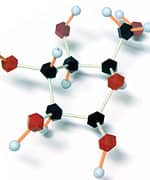|
Tuesday, January 20, 2015. The September 25, 2014 issue of Cell Reports published the outcome of research conducted at the University of California, Los Angeles which found that activation of adenosine monophosphate-activated protein kinase (AMPK) in one organ decelerated the aging process elsewhere in the bodies of fruit flies.
AMPK is a gene that is activated when cellular energy levels are low. The gene has also been found to be activated by the antidiabetic drug metformin. AMPK stimulates a process known as autophagy that enables cells to degrade and eliminate damaged components, which helps protect against aging. "We have shown that when we activate the gene in the intestine or the nervous system, we see the aging process is slowed beyond the organ system in which the gene is activated," commented senior author David Walker, who is an associate professor of integrative biology and physiology at UCLA.
For their research, Dr Walker, along with lead author Matthew Ulgherait and colleagues, examined over 100,000 genes in Drosophila melanogaster, a fruit fly that has been the subject of numerous other experiments in the field of gerontology. The team found that increasing AMPK in the flies' intestines increased life span by 30% and lengthened the portion of their lives spent healthy.
"A really interesting finding was when Matt activated AMPK in the nervous system, he saw evidence of increased levels of autophagy in not only the brain, but also in the intestine," Dr Walker reported. "And vice versa: activating AMPK in the intestine produced increased levels of autophagy in the brain—and perhaps elsewhere, too."
"Matt moved beyond correlation and established causality," he added. "He showed that the activation of autophagy was both necessary to see the antiaging effects and sufficient; that he could bypass AMPK and directly target autophagy."
"Instead of studying the diseases of aging—Parkinson's disease, Alzheimer's disease, cancer, stroke, cardiovascular disease, diabetes—one by one, we believe it may be possible to intervene in the aging process and delay the onset of many of these diseases," Dr Walker predicted. "We are not there yet, and it could, of course, take many years, but that is our goal and we think it is realistic."
|
|







